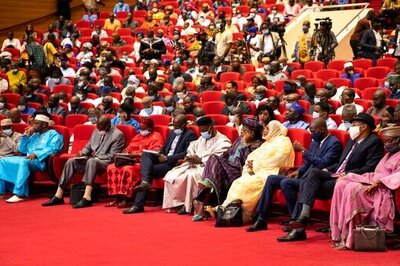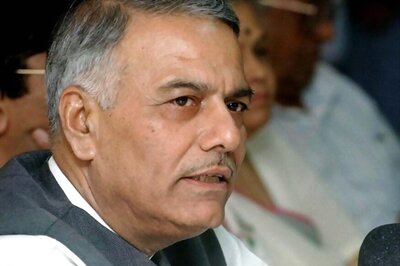
views
When veteran actor ShammiKapoor breathed his last, social media said “Md. Rafi died once again!” Such is the impact of a playback singer in the career of an Indian actor, where the later’s on screen image is partially defined by a melodious partner who becomes his extended voice expressing different moods and emotions from behind the screen! Such partnership has happened many times in the past. MukeshJi-Raj Kapoor, Md. Rafi-ShammiKapoor, Md. Rafi-Dileep Kumar, Kishore Kumar-DevAnand, Kishore Kumar-Rajesh Khanna, Kishore Kumar-Jeetendra, Kishore Kumar-Amitabh Bachchan are legendary examples. Even when the Khan triumvirate emerged during 1990’s, the audience was delighted to acknowledge Udit Narayan’s sweet poise as the consistent voice of Aamir Khan, S.P.Balasubramanium’s vocal flambouyancegelled perfectly with the vibrance of Salman Khan and Kumar Sanu’s unusual melodiously` nasal pronunciations seemed to bea fresh emotional expression defining Shah Rukh Khan.
Soon though, such affiliations fizzled out. The film makers started experimenting with their musical ensemble and every singer was singing for every actor, instead of staying favourite to or for anyone specific. However, as Shah Rukh Khan emerged as the “King of Romance” in subsequent years, his fall back on the musical partners in helping him create and sustain this title consistently for years must have been huge! Let’s explore.
Almost everyone, whom I asked about the first playback singer who lent his voice to Shah Rukh Khan in his debut film, came out with the impromptu response – “Kumar Sanu in Deewana (1992)”. Those who didn’t notice before would be surprised to know that it was VinodRathode and not Sanu, who sang two songs filmed on newcomer Shah Rukh Khan in the Rishi Kapoor-DivyaBharti starrer Deewana! In the same film, Sanu, an acclaimed music professional by then, was the voice of the veteran, Rishi Kapoor! Sanu’s association with Khan started with Chamatkkar (1992) and got strengthened with films like Raju Ban Gaya Gentleman (1992), Baazigar (1993), KabhiHaanKabhi Na (1994), Pardes (1997) and others, and remained his dominant playback singer till KuchKuchHotaHai (1998). Those were the most formative years of Shah Rukh Khan and with every film he was slowly and steadily strengthening his hold in the hearts of Indian audience. As much as Shah Rukh Khan explored the various extremes of “love”, from violent to mushy, Sanu unapologetically poured in his distinct brand of nasal interference in music and both the actor-singer duo soon got known as path-breakers in their respective fields. One of the most impactful products under Khan-Sanu partnership was the film Baazigar. Shah Rukh Khan took huge risk in personifying a negative protagonist in the film.Sanu’sYe Kali KaliAnkhen lent energy and appeal while the title song was simply about magic and romance; and Baazigar became one of SRK’s official pet names for subsequent years.Sanu’s vocal genius seemed to have explored the vulnerable side of Khan and together they had numerous intense musical moments all through the ‘90’s.
With a characteristic innocence and childlike restlessness in his voice, it was singer Abhijeet Bhattacharya who collaborated with Khan to deliver some songs that brought the King of Romance title closer to him! Quite similar to Sanu’sstart with Khan, Abhijeet lent his voice to a song in HemaMalini’sDilAashnaHai, which was also one of SRK’s initial films, but he playbackedthere for Jitendra. Abhijeet raised his storm standing behind SRK with the song BadiMushkilHai in the film Anjaam (1994) and his melody accompanied Khan in important projects like Yes Boss (1997), Baadshah (1999), PhirBhiDilHain Hindustani (2000), Ashoka (2001), ChalteChalte (2003), Main Hoon Na (2004), Om Shanti Om (2007) and others. Baadshah and PhirBhiDilHain Hindustani did not do well at box office, and yet their songs were well received by the audience. PhirBhiDilHain Hindustani’s I’m The Best started getting compared with Khan’s off-screen arrogance and romantic numbers from all these films stand out prominently because oftheir own merits. Badshah has also become the most accepted second name of SRK and the title track still plays at nightclubs and parties. No SRK lover has ever disowned this song. Abhijeet’s voice has always been a smooth, idealist, yester-year romance, which is in-depth and honest, and takes the audience to a dreamy journey through his musical brilliance. Shah Rukh Khan was trying to achieve the same journey through his films, and their partnership of many years seemed to be just perfectly timed and placed!
Udit Narayan’s voice adds poise, balance and grace to the music he stands for and that is what he offered to Shah Rukh Khan’s on-screen characters. Starting with a much forgotten JawaniDeewani in Chamatkkar (1992), he playbacked for one of Khan’s career defining films, Darr, and immortalised the two songs he sang in the 1993 film! Jaadu Teri Nazar is the song every shy and silent lover still relates to.He went on to sing for Khan in films like DilwaleDulhania Le Jayenge (1995), Dil To PagalHai (1997), KuchKuchHotaHai (1998), Mohabbatein (2000), KabhiKhushiKabhi Gam (2001), Devdas (2002), Veer Zaara (2004), and many others. E Ajnabi from Dil Se (1997), Ye TaaraWohTaara from Swades (2004), Mai Yahan Hu Yahaan from Veer Zaara (2004) are some iconic contributionsin his career. A film’s music and its playback singers have always managed to communicate what often the dialogues of the actors could not, and that is where Udit Narayan’s importance lies in the filmography of Shah Rukh Khan. During the ‘90s and the decade following 2000, when Khan was experimenting with different dimensions of romance, Udit Narayan’s voice seemed to offer a steady consistence to the actor’s inherent flickering energy and that felt more settling and eternal. Just a few days ago, a friend of mine, who is also a well knownBollywood filmcritic, had joked, “Udit Narayan and JuhiChawla are the two most expensive people SRK shared with Aamir Khan; in fact he silently took them away and never returned!” The statement was meant to be a passing remark, but there does lay an element of truth in it.
Sonu Nigam sang much less for SRK compared to the other three. While Sanu, Abhijeet and Udit Narayan held the fort during Khan’s formative years, Sonu Nigam lent his voice when Shah Rukh Khan was already at the peak of his career. His innings started in 1997 with Pardes, a film dominated by Kumar Sanu with two of his exotic romantic tracks. Nigam was used here to portray betrayal and pain, and he put his best foot forward with a very intense and spirited Ye DilDeewana, which became a rave among music lovers and also marked the arrival of the singer as one among the best in business. Nigam went on to deliver his musical excellence through songs like Satrangifrom DilSe (1998), title track of KalHo Na Ho (2003) and Main Hoon Na (2004), Do Pal and KyoHawa in Veer Zaara (2004), the soulful DheereJalna and Laaga Re JalLaaga in Paheli (2005), title track and a very romantic TumhiDekho Na in KabhiAlvida Na Kehna (2006); he was the dominant singer in films likeKabhiKhushiKabhi Gam (2001). Sonu Nigam very distinctly brought passion to the songs he playbacked for Shah Rukh Khan. Their partnership has been celebrated and talked about more because Nigam has been the “Voice of Love” by his own rights and Khan the “Face of Romance”! Off screen too, Sonu Nigam’s boyish looks has been a focus of attention among women and his vocal charm seemed to be the perfect vocal match to Khan’s on-screen charisma. The actor-singer duo hence together created a complete package that was more in-depth than just the story of a film or the notes of a song.
Renowned music critic Rajiv Vijayakar has an insightful view to share on this. “Music certainly has a huge impact on the image of a Bollywood actor, but the credit ideally should go to music directors and composers. But we talk more about the playback singers because they hand-hold the song to success! They are the ones you hear; but the creation of music has a more in-depth impact than the execution. LakshmikantJi once told me, that when he was working on the music of Bobby, he realised that the hero was a boy who spent a large part of his life in a convent boarding school; so he can’t be reciting urdushayaris in love, though that was the most usual expression of lovein those days! That was how Main ShayarToNahin was created. So that is the kind of thought that goes behind the songs that are mouthed by the actors. Of course playback singers too have poured in their due research in the past. LataJi said that she studied the way a heroine conducted herself and put that sensibility into the songs she voiced. Rafi Sahab sang for tragedy king Dilip Kumar and also the very charming ShammiKapoor; both actors were diametrically opposite in their characters and so was the music their films carried. But Md. Rafi was successful in both! However, numerically DevAnand’s filmography had more of Rafi Sahab’s songs than Kishore Kumar’s. But the DevAnand-Kishore Kumar partnership gets more talked about! It is clearly, a connection in persona of the singer and the actor; popularity comes later. And when popularity comes, it obviously leads to an association!”
About Shah Rukh Khan’s romantic image, Rajiv Vijayakar credits music composers JatinLalit and Annu Malik more than the singers, which is very correct logically! When it comes to the playback singers, he believes that Sonu Nigam’s impact is the least in SRK’s filmograph because Nigam ventured in the actor’s career when SRK had already attained his image; rather Abhijeet should be the one credited most for voicing Shah Rukh Khan, followed by Udit Narayan and Kumar Sanu.
No wonder that Shah Rukh Khan’s “King of Romance” title is a fruit of his own vision and action. But in Indian films, especially Bollywood commercial flicks, music and songs have an immense role to play. And if you choose to think about it, you would perhaps agree that without Kumar Sanu’s vulnerability, Udit Narayan’s poise, Abhijeet Bhattacharya’s dreamy appeal and Sonu Nigam’s passion, the music that impacted SRK films would have stood considerably incomplete and so would the “King of Romance” title!


















Comments
0 comment